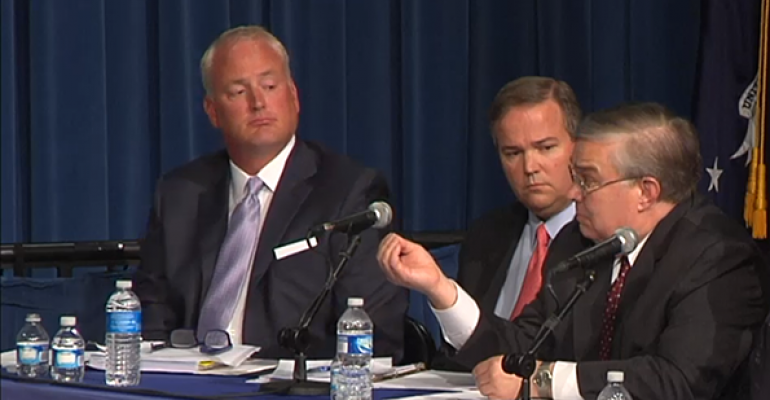Industry advocates on Wednesday aired their concerns about what they see as the limitations of the Department of Labor’s proposed fiduciary rule, suggesting that the language detailing the conditions under which conflicted business models could still operate as advisors to retirement accounts is “squishy” and far from business-model neutral.
Representatives for the Financial Services Institute and Kent Mason, a partner with Davis & Harman, took umbrage with the best interest contract exemption portion of the re-proposed rule, which would allow firms with business models that conflict with the standard to continue acting as advisors as long as they commit to acting in their client's best interest and disclose any conflicts that may not allow them to do so.
"It's a big problem," Mason told DOL staff during a panel on the third day of public hearings on the proposal, adding that while it doesn't specifically mandate brokers charge a "level fee" for their investment advice, meaning a broker's compensation would need to be the same regardless of the advice given, or firms better have a "darn good reason for not doing so."
FSI also took shots at the practical application of the exemptions, saying they would, despite the intention, in fact bar commission-based business.
“The proposed conditions governing compensation practices are not business model neutral,” testified Mark Smith, a partner with Sutherland Asbill & Brennan LLP, representing FSI. “While commission-based compensation models remain available in form, there is no clear path through the exemption that our members can rely on with confidence.
“We see no structural reason why broker/dealers cannot serve the best interests of their clients,” he added.
DOL staff took exception to that, stating that they only intend to prohibit incentives that run contrary to a best interest standard.
“It seems virtually everyone who has come in here to talk to us has said that they think they act in their customers’ best interest and they support a best interest standard,” said Tim Hauser, the deputy assistant secretary for program operations of Employee Benefits Security Administration at the DOL.
"It sounds like you’re saying that you don’t understand, that you need more clarity, not that you can’t comply,” added Lyssa Hall, director of the Office of Exemption Determinations, in response to FSI's criticisms of the best interest contract exemption.
Smith fired back, saying FSI did not lack comprehension, but rather that the rule in its current state was unworkable for firms. The industry group added it would support the model for addressing the procedures around conflict mitigation laid out in FINRA’s Conflict of Interest Report from 2013. Smith also said that FSI was not advocating for a “disclosure only” approach to fees and broker compensation.
But Hauser wasn’t entirely buying it. “A cautionary word, a lot of folks have given guidance, but one thing I’m thinking hard about as I look at these suggestions ... is there a sense in which the firm’s conflict of interest is just being directly transmitted to the advisor?
“That would worry me," he continued. "If the policy or procedure simply said ... the more money this recommendation will make for the firm, the more money I’m going to pay you, that’s aligned alright. But it doesn’t seem like it’s necessarily aligning the advisor’s interest with the customer.”





